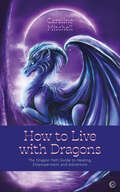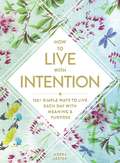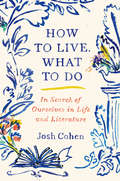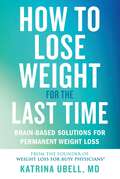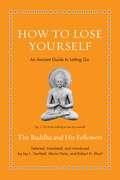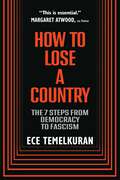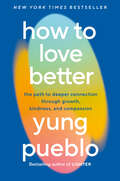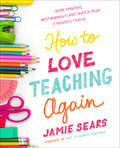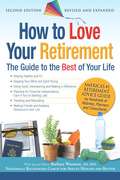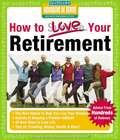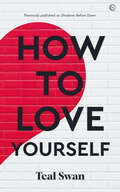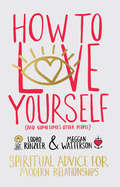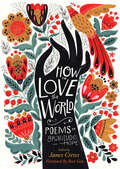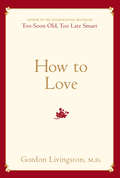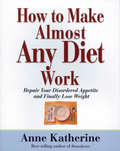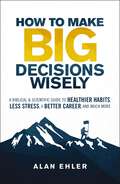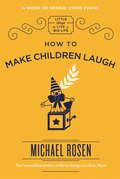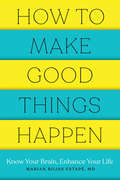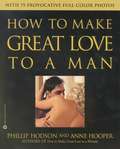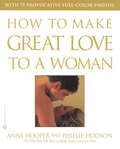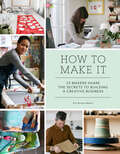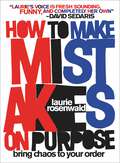- Table View
- List View
How to Live with Dragons: The Dragon Path Guide to Healing, Empowerment and Adventure
by Caroline MitchellA complete guide to finding and working with your personal dragons for healing, empowerment and adventure from Caroline Mitchell, bestselling creator of the Dragon Path Oracle Cards.How to Live with Dragons is the book Caroline Mitchell, the "Original Dragon Lady", wishes she had when she began her dragon journey. Encapsulating two decades of working with dragon energy, it is a complete guide to finding and working with your personal dragons for healing, empowerment and adventure. Packed full of journaling activities and prompts for reflection, meditations, visualisation guidance and author tips, it will help readers contact, communicate with and learn from dragons in day-to-day life, avoiding the pitfalls Caroline herself encountered. It also shows how readers can become, like the dragons themselves, spiritual warriors of the Earth. Featuring many of the same dragons from Caroline&’s bestselling Dragon Path Oracle Cards, this book can be used as a companion to the deck or enjoyed as a standalone guide to living and working with dragons.
How to Live with Intention: 150+ Simple Ways to Live Each Day with Meaning & Purpose
by Meera LesterDiscover simple ways to live a more purposeful, peaceful, and enjoyable life with this empowering guidebook to intentional and mindful living. It’s time to put intention behind all of your actions and live a focused and fearless life! In this accessible guide, you’ll learn easy ways to infuse everyday activities—from waking and bathing to eating and walking—with a sense of purpose. Each act is designed to improve your sense of health, peace, prosperity, gratitude, and renewal. Examples include: —Eliminate thoughts of what is lacking —Move past perfection —Fire up your authentic voice —Strengthen love bonds —Learn to be precise Each chapter contains ritual sequences to help you carry your intentions throughout your day. With a wide and varied range of activities, you’ll be able to create a unique routine to fit every mood, need, interest, and desire. With How to Live with Intention, you’ll transform ordinary tasks into purposeful ways to relish each moment, live your best life, and experience true happiness.
How to Live. What to Do: In Search of Ourselves in Life and Literature
by Josh CohenA brilliant psychoanalyst and professor of literature invites us to contemplate profound questions about the human experience by focusing on some of the best-known characters in literature—from how Virginia Woolf&’s Mrs. Dalloway copes with the inexorability of midlife disappointment to Ruth's embodiment of adolescent rebellion in Kazuo Ishiguro&’s Never Let Me Go. &“So beautiful ... a fantastic book.&” —Zadie Smith, best-selling author of White TeethIn supple and elegant prose, and with all the expertise and insight of his dual professions, Josh Cohen explores a new way for us to understand ourselves. He helps us see what Lewis Carroll&’s Alice and Harper Lee&’s Scout Finch can teach us about childhood. He delineates the mysteries of education as depicted in Jane Eyre and as seen through the eyes of Sandy Stranger in The Prime of Miss Jean Brodie. He discusses the need for adolescent rebellion as embodied in John Grimes in James Baldwin&’s Go Tell It on the Mountain and in Ruth in Kazuo Ishiguro&’s Never Let Me Go. He makes clear what Goethe&’s Young Werther and Sally Rooney&’s Frances have—and don&’t have—in common as they experience first love; how Middlemarch&’s Dorothea Brooke deals with the vicissitudes of marriage. Vis-a-vis old age and death, Cohen considers what wisdom we may glean from John Ames in Marilynne Robinson&’s Gilead and from Don Fabrizio in Giuseppe Tomasi di Lampedusa&’s The Leopard.Featuring: • Alice—Lewis Carroll, Alice's Adventures in Wonderland / Through the Looking Glass • Scout Finch—Harper Lee, To Kill a Mockingbird • Jane Eyre—Charlotte Brontë, Jane Eyre • John Grimes—James Baldwin, Go Tell It on the Mountain • Ruth—Kazuo Ishiguro, Never Let Me Go • Vladimir Petrovitch—Ivan Turgenev, First Love • Frances—Sally Rooney, Conversations with Friends • Jay Gatsby—F. Scott Fitzgerald, The Great Gatsby • Esther Greenwood—Sylvia Plath, The Bell Jar • Clarissa Dalloway—Virginia Woolf, Mrs. Dalloway • And more!
How to Lose Weight for the Last Time: Brain-Based Solutions for Permanent Weight Loss
by Katrina UbellThe missing piece to the most sought-after health goal, How to Lose Weight for the Last Time offers brain-based solutions for dropping pounds and keeping them off without suffering or sacrifice. As a pediatrician, Katrina Ubell, MD, always struggled with her weight--she was either 40 pounds overweight, or struggling to lose that weight. Although she'd regularly counsel parents on the importance of keeping their kids healthy and fostering good eating habits, Dr. Ubell, as a busy professional, was never able to do the same for herself. Like everyone else, she tried many different diets and programs, but would always regain the weight. In 2015, Dr. Ubell "cracked the code" for making weight loss permanent, and developed a program targeted at busy physicians like herself who often de-prioritize their own wellness. As a weight loss coach, Dr. Ubell has helped over 1,000 busy physicians and professionals find and stay at a healthy weight with her brain-based program, and is now ready to bring this program to the general public. Dr. Ubell's program doesn't involve any unrealistic diets, plans, special foods, supplements, or even rigorous exercise protocols; instead, she uses a deep understanding of the brain and behavior patterns to get results. Through her work, she has been able to uncover and speak into the universal obstacles that stand in our way of losing and keeping off weight.
How to Lose Yourself: An Ancient Guide to Letting Go (Ancient Wisdom for Modern Readers)
by Jay L. Garfield, Maria Heim, and Robert H. SharfInviting new translations of classical Buddhist texts about why the self is an illusion—and why giving it up can free us from sufferingFrom self-realization and self-promotion to self-help and the selfie, the modern world encourages us to be self-obsessed. We are even told that finding ourselves is the key to happiness. Better to lose yourself! More than 2,500 years ago, the Buddha argued that the self is an illusion—and that our belief in it is the cause of most, if not all, of our suffering. How to Lose Yourself presents lively, accessible, and expert new translations of ancient Buddhist writings about the central, unique, and powerful Buddhist teaching of &“no-self.&”Drawn from three important Buddhist traditions, these essential Indian, Tibetan, and Chinese writings provide a rich sampling of the ways Buddhist philosophers have understood the idea that we are selfless persons—and why this insight is so therapeutic. When we let go of the self, we are awakened to the presence of all things as they truly are, and we let go of the anxiety, fear, greed, and hatred that are the source of all suffering.Complete with an introduction and headnotes to each selection, and the original texts on facing pages, How to Lose Yourself is a concise guide to a transformative idea.
How to Lose a Country: The 7 Steps from Democracy to Fascism
by Ece Temelkuran&“Essential.&” —Margaret Atwood An urgent call to action and a field guide to spotting the insidious patterns and mechanisms of the populist wave sweeping the globe from an award-winning journalist and acclaimed political thinker.How to Lose a Country is a warning to the world that populism and nationalism don&’t march fully-formed into government; they creep. Award-winning author and journalist Ece Temelkuran identifies the early warning signs of this phenomenon, sprouting up across the world from Eastern Europe to South America, in order to arm the reader with the tools to recognise it and take action. Weaving memoir, history and clear-sighted argument, Temelkuran proposes alternative answers to the pressing—and too often paralysing—political questions of our time. How to Lose a Country is an exploration of the insidious ideas at the core of these movements and an urgent, eloquent defence of democracy. This 2024 edition includes a new foreword by the author.
How to Love Better: The Path to Deeper Connection Through Growth, Kindness, and Compassion
by Yung PuebloThe #1 New York Times bestselling author of Lighter offers a blueprint for deepening your compassion, kindness, and gratitude so you can truly grow in harmony with another person and build stronger connections in all your relationships.&“A beautiful offering from the heart, to the heart.&”—Elizabeth Gilbert &“Yung Pueblo holds a mirror to the relationships we have and offers clear directions to the relationships we desire.&”—Simon Sinek &“How to Love Better is destined to change your life.&”—Lena Waithe&“Everyone enters relationships with imperfections and negative patterns that block the flow of love, but when you embrace growth, the new harmony within you will flow into your relationship.&”Love enters our lives in many forms: friends, family, intimate partners. But all of these relationships are deeply influenced by the love we have for ourselves. If we see our relationships as opportunities to be fully present in our healing and growth, then, Yung Pueblo assures us, we can transform and meet one another with compassion instead of judgment.In How to Love Better, Yung Pueblo examines all aspects of relationships, from the rose-colored early days when you may be hesitant to show your full self, to the challenges that can arise without clear communication, to dealing with heartbreak and healing as you close a chapter of your life. The power of looking inward remains at the core of Yung Pueblo&’s teachings. Ego and attachment can become barriers in a relationship, so the more self-aware you become, the more you can support both your partner and yourself.How to Love Better includes:• How to build harmony in a relationship• How to see each other&’s perspective• How to find the right partner• How to heal from heartbreak• How to overcome attachment• How to form commitments• How to argueYung Pueblo&’s insights on embracing change, building a foundation of honesty, and learning to listen selflessly will resonate regardless of where you are in your healing journey. And his unique combination of poetry, personal experience, and thoughtful advice will help you grow and strengthen all of your relationships.
How to Love Someone Without Losing Your Mind: Forget the Fairy Tale and Get Real
by Todd BaratzA sanity-saving guide that cuts through the sky-high expectations of modern love and helps you build healthier and more fulfilling relationships, from the creator of viral Instagram account YourDiagnonsense &“Witty, practical, fun, and deeply honest.&”—Terrence Real, New York Times bestselling author of UsYou&’re not crazy. You&’re human.Modern love is a mess and life is (spoiler alert!) very hard. Whether you&’re in a committed relationship or on the apps, buckle up, there&’s a lot to unlearn.How to Love Someone Without Losing Your Mind is your guide to sanity in a culture gone mad. Psychotherapist and sex therapist Todd Baratz blends sharp humor with raw insight as he challenges us to break every rule about love. It&’s time to move beyond the relentless pursuit of the perfect partner, to challenge the stigma against neediness, and to rethink our obsession with diagnosing common challenges as disorders.Instead, he offers an empowering new perspective: Embrace challenges, feel deeply, make mistakes, learn, and grow. Drawing from his extensive experience as both a therapist and a patient, Baratz shares stories of navigating his personal traumas and guiding others through theirs.This book is an invitation to understand your life as part of a larger cultural narrative. It encourages you to delve into your history, cultivate self-awareness, and take responsibility in your relationships. By doing so, you can move beyond the fairy tale and transform your approach to love.
How to Love Teaching Again: Work Smarter, Beat Burnout, and Watch Your Students Thrive
by Jamie SearsA heartfelt, hands-on guide to setting boundaries, increasing productivity, and finding fulfillment for teachers who know that their classrooms won&’t thrive unless they do.Over time, teachers internalize myths about their success that cause them to fall out of love with teaching. &“I&’ll never be one of the 'perfect' teachers&’&”&“My self-worth is defined by my students&’ test scores&”&“The only way to get it all done is to work on weekends&” How to Love Teaching Again kicks these myths to the curb and replaces them with practical tips to defeat burnout, overcome perfectionism, and restore the joy of teaching. As the CEO of Not So Wimpy Teacher, one of the most popular teaching resource brands on the internet, Jamie Sears has spent years designing tools and inventing strategies that restore the joys of teaching. This book offers simple step-by-step strategies that have helped thousands of teachers around the country transform their relationship with work, including: Reinventing small groups and centers so that they&’re easier to manage—and so you don&’t feel like you&’re spread thinA foolproof productivity system just for teachers, including a life-saving method for batching lesson plansScripts for establishing boundaries that will drastically reduce the time you spend lesson planning, responding to emails, and planning extracurriculars Our education environment is often stacked against teachers—from insufficient funding and mandatory meetings to red tape and standardized testing. Drawing on real-life struggles from the teachers who have used Sears' strategies to overcome burnout and make the most of their time, How To Love Teaching Again will give you specific steps to stop drowning in to-dos and do the work that inspires you.
How to Love Your Retirement
by Hundreds of Heads Books Barbara WaxmanReady or not, here it comes: your retirement years! The third phase in your life.You can look forward to good and interesting times if you're prepared, and Love Your Retirement is packed with helpful, entertaining stories and lots of real-life advice from hundreds of retirees who are making the most of their golden years.Love Your Retirement lets readers learn about the NEW retirement: the un-retirement, Protirement, encore experience, from renewment trailblazers. It will introduce the exciting possibilities about how to think about and experience retirement and to hear from 'hundreds of heads' who are doing it in this new and satisfying way.Stories are:* Inspirational* Funny* Touching* EducationalAmong the topics covered:-How to pick the best time to retire-Home again: learning to live with your spouse 24/7-A new life: starting fresh in business, love, and family-Back to school--it's more than being Old Person On Campus-Footloose: traveling your days away-Health: how to stay fit and beat the insurance system-Grandkids: how to be the best grandparent in the world-Volunteering and Working: staying busy and productive
How to Love Your Retirement
by Hundreds of Heads Books Bob Mendelson Barbara WaxmanHow to Love Your Retirement shows the baby-boom generation how to plan for, and succeed at, this statge of life, whether relaxation, travel, education, or even a new occupation is the goal. Packed with helpful, entertaining stories and real-life advice from hundreds of retirees who are making the most of their post-work lives, this honest and useful guide covers such topics as how to pick the best time to retire; learning to live with a spouse 24/7; staying fit; starting fresh in business, love, and family; traveling; going back to school; and more.
How to Love Yourself
by Teal SwanAn inspiring guide to self-love from bestselling author and modern spiritual leader Teal Swan, who has over 2.8 million followers across Youtube, Instagram and Facebook.The journey to self-love can seem treacherous, especially in times of struggle. In this book, spiritual leader and bestselling author Teal Swan reveals that self-love is always achievable, whatever the circumstances. Through a comprehensive self-love toolkit, she shows you how to love yourself and heal your life. In this revised and updated edition of the popular Shadows Before Dawn, Teal bares her own experiences as an alienated extrasensory child and victim of abuse, revealing how she turned her life around, overcame self-hate and transformed her suffering into self-love and joy. To guide you on your own journey of healing and transformation, Teal shares the 29 extraordinary methods and techniques that she used to find self-love. These life-changing tools will help you to develop self-worth, practice self-love, learn to "fill your own cup", love your body and step into your purpose. Fans of The Anatomy of Loneliness will appreciate this no-nonsense guide from Teal on how to love yourself, even when life gets tough.
How to Love Yourself (and Sometimes Other People): Spiritual Advice For Modern Relationships
by Lodro Rinzler Meggan WattersonAre you trying to find love – and beginning to suspect you’re not looking in the right place? This wise, hip guide gives you a new map for the journey to happiness in relationships of all kinds, starting in your own heart.Told from the alternating vantage points of authors Meggan Watterson and Lodro Rinzler, How to Love Yourself (and Sometimes Other People) reminds us that love isn’t something we have to earn. All of us are deeply and intrinsically worthy of love – not only the love we hope to receive from others, but the love we give to ourselves – and this book offers the insight and practical tools we need to stay firmly grounded in self-love as we ride out the natural (and often stormy) cycles of relationships.Meggan and Lodro’s unique perspectives as teachers and scholars of Christian mysticism and Buddhism respectively make for a rich and lively dialogue that draws on wisdom sources like the Gospel of Mary Magdalene and the Four Noble Truths, along with funny, revealing stories from their own love lives and their deep friendship with each other. You’ll find guidance for embracing single life, dating with an open heart, and thriving in lasting love; meditations and practices for calm abiding, "disciplined hope," and connecting to the source of love within you; and tips on everything from sex, self-worth, and nourishing friendships to navigating breakups and learning to truly love yourself. Ultimately, you’ll be able to see your ideal partner in a new light – not as someone who "completes" you, but as someone who mirrors back to you your own wholeness.
How to Love the World: Poems of Gratitude and Hope
by James CrewsWhat the world needs now – featuring poems from inaugural poet Amanda Gorman, Ross Gay, Tracy K. Smith and more. More and more people are turning to poetry as an antidote to divisiveness, negativity, anxiety, and the frenetic pace of life. How to Love the World: Poems of Gratitude and Hope offers readers uplifting, deeply felt, and relatable poems by well-known poets from all walks of life and all parts of the US, including inaugural poet Amanda Gorman, Joy Harjo, Naomi Shihab Nye, Ross Gay, Tracy K. Smith, and others. The work of these poets captures the beauty, pleasure, and connection readers hunger for. How to Love the World, which contains new works by Ted Kooser, Mark Nepo, and Jane Hirshfield, invites readers to use poetry as part of their daily gratitude practice to uncover the simple gifts of abundance and joy to be found everywhere. With pauses for stillness and invitations for writing and reflection throughout, as well as reading group questions and topics for discussion in the back, this book can be used to facilitate discussion in a classroom or in any group setting. This publication conforms to the EPUB Accessibility specification at WCAG 2.0 Level AA.
How to Love: Choosing Well at Every Stage of Life
by Gordon LivingstonDr. Gordon Livingston-a physician of the human heart, a philosopher of human psychology-offers an urgently needed meditation on who best (and who best not) to love. As in his previous books, Dr. Livingston demonstrates an unerring sense of what is important, providing readers with a much-needed alternative to the trial-and-error learning that makes wisdom such an expensive commodity.
How to Make Almost Any Diet Work
by Anne KatherineIn How to Make Almost any Diet Work, Anne Katherine offers news to millions of Americans struggling to lose weight: Your willpower doesn't stand a chance against your body's biochemistry. Dieting sets you up for repeated failure until you address the underlying biochemistry triggering disordered appetite. Using How to Make Almost Any Diet Work as your guide, you will discover the degree to which your eating is chemically driven, and you will develop a personal plan for consuming normal amounts of food at appropriate intervals--a plan for life. Here is real hope backed by the latest research in brain and body chemistry.
How to Make Big Decisions Wisely: A Biblical and Scientific Guide to Healthier Habits, Less Stress, A Better Career, and Much More
by Alan EhlerOur decisions determine our lives. Invest in a company that goes bankrupt and you lose your life savings. Say the wrong thing in an interview and you miss the job of the lifetime. Make no decisions and you miss every opportunity. In today's rapidly changing world, the cost of poor decisions (and no decisions) is higher than ever.In How to Make Good Decisions Wisely, author and scholar Alan Ehler lays out a clear approach to making big decisions based on the Bible and recent discoveries in neuroscience and decision science. He presents a simple, four-step process that can be followed to make any kind of decision, whether personal, professional, or relational.Making big decisions can rewrite lives, careers, families, churches, and businesses. A lot is at stake. Learn how to choose well.
How to Make Children Laugh
by Michael Rosen'A WORK OF GENIUS' - Chris EvansJokes, a jack-in-the-box, jelly and jumping beans make children laugh.As do practical jokes, peekaboo, pantomine and poetry that makes no sense.Why and how does this work? And why does it matter?Writer and Professor of Children's Literature Michael Rosen, whose books - from We're Going on a Bear Hunt to Chocolate Cake - have made millions of children rock with laughter, gives us the tools for this greatest of gifts.
How to Make Children Laugh (Little Ways to Live a Big Life #1)
by Michael Rosen'A WORK OF GENIUS' - Chris EvansJokes, a jack-in-the-box, jelly and jumping beans make children laugh.As do practical jokes, peekaboo, pantomine and poetry that makes no sense.Why and how does this work? And why does it matter?Writer and Professor of Children's Literature Michael Rosen, whose books - from We're Going on a Bear Hunt to Chocolate Cake - have made millions of children rock with laughter, gives us the tools for this greatest of gifts.
How to Make Good Things Happen: Know Your Brain, Enhance Your Life
by Marian Rojas EstapeAn empowering journey through the mechanisms of the mind from one of the world’s leading mental health experts. For those in pursuit of a better life, psychiatrist Marian Rojas Estapé presents the essential guide to neuroscience-driven mindfulness. Understanding your brain, managing your emotions, and being aware of your responses to stressors can give you greater self-control. Rather than a gimmicky guidebook, this is a thorough look at how our brains react to stress, threats, hyperstimulation, and the vices of our digital age. With proven techniques backed by solid, up-to-date psychiatric research, Estapé teaches us how to make the best of our lives. Combining science, psychology, and philosophy, Estapé delivers practical advice about how we can cultivate a happy existence. This includes understanding the parts of the brain, setting healthy goals and objectives, strengthening willpower, cultivating emotional intelligence, developing assertiveness, avoiding excessive self-criticism and self-demand, and mastering the proven art of optimism.
How to Make Great Love to a Man
by Anne Hooper Phillip HodsonThere have been sex manuals written from the man's perspective, and there have been sex manuals written from the woman's perspective. Now, for the first time, two long-term partners, both bestselling authors and sex and marriage therapists, have come together to produce the ultimate guides to making love, for men and for women. Based on scientific research-and years of personal experience with each other-these guides have insights, techniques, and positions that can't be beat. Both books sizzle with 75 lush, titillating, full-color photographs of couples in the act of making love, and both illustrate and describe sexual techniques, practices, games, and secrets guaranteed to satisfy anyone and everyone. Not only will these books help partners to better please one another, but they will also help each partner to understand-and have fun with-their own sexuality.
How to Make Great Love to a Woman
by Anne Hooper Phillip HodsonThere have been sex manuals written from the man's perspective, and there have been sex manuals written from the woman's perspective. Now, for the first time, two long-term partners, both bestselling authors and sex and marriage therapists, have come together to produce the ultimate guides to making love, for men and for women. Based on scientific research-and years of personal experience with each other-these guides have insights, techniques, and positions that can't be beat. Both books sizzle with 75 lush, titillating, full-color photographs of couples in the act of making love, and both illustrate and describe sexual techniques, practices, games, and secrets guaranteed to satisfy anyone and everyone. Not only will these books help partners to better please one another, but they will also help each partner to understand-and have fun with-their own sexuality.
How to Make Huge Cash with Section 8 Rentals: The Landlord Handbook
by Ernie BraveboyLearn the best way to make money investing in section 8 rentals). This book gives you the exact details on how to find, analyze, and manage section 8 rental properties. Where other books lack the details on how to actually make money with section 8, this book is all about the details. It is written by someone who has been investing in real estate for over 15 years and is still investing today.would you like to get guaranteed rent would you like to get the best tenants , this book will teach you how to pass section 8 inspection, or how to buy with little cash, this books tells you how to overcome those obstacles. If you can't find your answer in the book, ernie even gives away his email address where you can ask him directly.if you want to be successful in real estate without problem tenants and get your rent on time you need this book.
How to Make It: 25 Makers Share the Secrets to Building a Creative Business
by Erin Austen AbbottTwenty-five creative entrepreneurs reveal how they found success, offering advice and inspiration for those hoping to follow suit or find a new hobby.This is the ultimate tell-all, show-all guide to making a living by making things. Featuring twenty-five profiles of illustrators, jewelry designers, ceramicists, painters, clothing designers, and printmakers, How to Make It provides a behind-the-scenes look at the daily rituals and best practices that keep these creative entrepreneurs on track. With Q & As, insider tips, and DIYs from each maker, these pages offer guidance and encouragement to artists just starting their careers and to professionals looking to take their creative business to the next level. Brimming with practical advice and inspiration, this book is a perfect gift for anyone interested in making it as a maker.Praise for How to Make It“Readers curious about starting a creative business will find these 25 interviews with artisans an entertaining introduction to the challenges and rewards of turning art into a livelihood . . . . In addition to photographs of the artists at work, the book includes craft projects developed by the artisans for beginners, giving the book a broader appeal to readers dreaming of giving up their nine-to-five jobs or just considering new hobbies.” —Publishers Weekly
How to Make Mistakes On Purpose: Bring Chaos to Your Order
by Laurie RosenwaldBased on Laurie Rosenwald's popular workshop, How to Make Mistakes On Purpose reveals an intuitive, entertaining way to come up with truly original ideas. Three generations of humans have now been molded into results-oriented workers who cannot mess up, and therefore may never innovate either. Shared software, skills, and experiences equal no surprises. Surrounded by the unwavering, reliable results made possible by a machine, we all marinate in this ubiquitous cybersauce. Behold! Thousands of shiny new apps, sites, products, and services that look, feel, and are essentially the same. Because computers don&’t make mistakes.Chance is the natural foil to the digital. We combine both for originality. This makes for the kind of exciting, hopeful future we want. We embrace technology but need to slap it around a bit to get someplace new.Human error sparks connections. In a relaxed situation where one&’s hypercritical demons are AWOL, the snap, crackle, pop of brainstorms happen all around us.A fresh, colorful guide to discovery, with clearly marked directions and witty prompts, this is a book about living a productive, individualistic life. Whatever your job, it gives you a way to zig while everyone around you can only zag. It will also make you laugh along the way.
